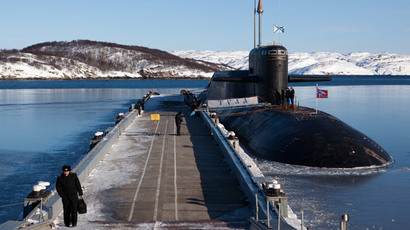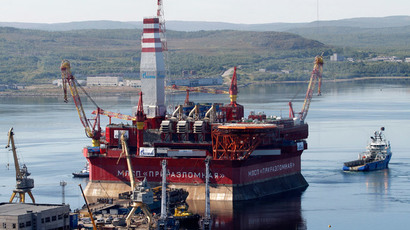Ice voyage challenge: RT joins Russian Navy fleet in Arctic base build-up mission

Russia's Northern Fleet is testing its capabilities to the limit, conducting a series of rigorous drills in the Arctic. RT's Murad Gazdiev joined the destroyer Admiral Levchenko on a mission to re-equip a key naval base in the White Sea.
Six Navy ships, including the anti-submarine destroyer, two landing ships and support vessels, are navigating through the frigid waters of the Kara Sea. They are escorted by two civilian icebreakers that are likely to be needed when the ice conditions worsen.
The Admiral Levchenko is carrying supplies and fresh personnel from Severomorsk, a town in the Murmansk Region, northwest Russia, to the Kotelny Island in the White Sea. They will take part in the ongoing rebuilding of an old military base, which had been abandoned almost three decades ago and which was reopened last year as part of Russia’s military build-up in the Arctic.
Russian Navy sends flotilla to Arctic to start permanent service at military base
The crew of the Admiral Levchenko told RT’s Murad Gazdiev about the difficulties of the Arctic voyage.
“The situation with ice is difficult, so we’ve ordered icebreakers to guide us... We are going to hit the ice, and we’re going to be going through it for days and nights,” Captain First Class Dmitry Fedorov told RT.
Northern defense: RT's on-the-spot report from Russian naval maneuvers in the Arctic

RT was on board to witness this naval exercise as the convoy simulates a conflict situation to test its response.
“One of our helicopters has just identified an ‘enemy submarine’ close to the naval battle group. They’ve elected for to repel the threat with the RBU6000 depth charge cannon. We’ve just fired two rounds at the coordinates where the ‘enemy submarine’ was seen,” Gazdiev reported, struggling to speak over the noise of the cannon’s blasts.
The ships’ two helicopters were busy performing scouting missions in the expectation of iceberg sightings. The RT crew that was taking part in a flyover spotted the real hosts of the Arctic – polar bears and seals.
The other two warships taking part in the voyage are the landing ships Georgiy Pobedonosets and Kondopoga. The support vessels include tanker Sergey Osipov, rescue tug Pamir and the lifting-and-mooring vessel Aleksandr Pushkin

The two Arktika-class nuclear-powered icebreakers in the ship group are Yamal and 50 Let Pobedy. The latter is the largest nuclear-powered icebreaker in the world.
Permanent Arctic military presence
The Russian military returned to the New Siberian Islands, of which the Kotelny Island is part, in 2012 with a landing exercise.
In 2013, a fleet headed by the flagship of the Northern Fleet, the nuclear-powered guided-missile cruiser Pyotr Veliky, delivered equipment to the New Siberian Islands to restore the local permafrost airfield Temp. The expedition also built new modern houses as replacements for field tents, in which the troops involved in the reconstruction were living initially.
According to the Northern Fleet commander, Admiral Vladimir Korolyov, the major goal of the latest expedition “is to deliver personnel, equipment and property of the Northern Fleet’s tactical group, which starting this year is going to fulfill military service at the New Siberian Islands on a permanent basis.”

Russia’s Arctic resurgence is viewed with caution by some other nations with stakes in the resource-rich region. Canada’s foreign minister, John Baird, criticized the drills in August. He told Denmark’s Berlingske newspaper that Ottawa was “determined to promote and defend the sovereignty of Canada in the Arctic” in the face of what he described as the Russian threat.
Russia’s Foreign Minister Sergey Lavrov dismissed Baird’s accusations as “nonsense”. President Vladimir Putin later said that Russia was determined to defend its interests in the Arctic, but will only do so in compliance with international law.
“Many are wary of our efforts [in the Arctic], are scared by them. We have said many times that we will only act within the framework of international law, as we have always done and are going to do in the future,” Putin said.














